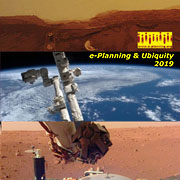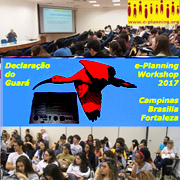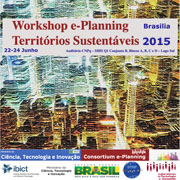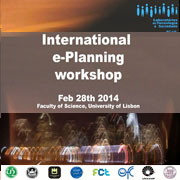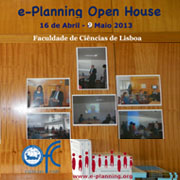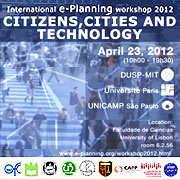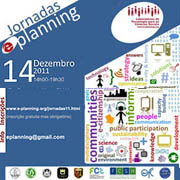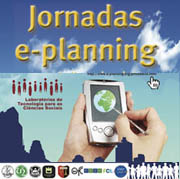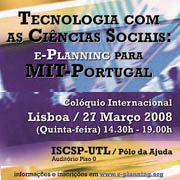 |  | |
| e-Planning Events | January 12, 2021, 5h30 PM |
"Artificial Intelligence and the Computable City"
by Michael Batty
Centre for Advanced Spatial Analysis (CASA), University College London
Discussant: Joseph Ferreira Jr., Dept. Urban Studies & Planning, MIT
Host: Fac. Arquitectura, Universidade de lisboa, PhD e-Planning courses on:
"Smart Cities and Digital Citizenship" | and |
"Artificial Intelligence in Planning" | ||||
Faculty: | ||||||
|
||||||
An open and free event, on e-Planning Lab zoom room, with pre-registration (72 registered). The session was videotaped (view clip) (view slides).
ABSTRACT
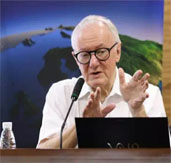 In this talk, I outline the digital revolution in terms of computation and how this is changing the form and structure of cities. I focus on the difference between the high and low frequency city, with the high frequency city dealing with what takes place in cities over very short periods of time in contrast to the low frequency city which deal with how cities change over years, decades and even centuries. Computation is being embedded into the contemporary city and this is leading to the acquisition of real time data that enables to control and manage functions and activities in cities in near real time itself.
In this talk, I outline the digital revolution in terms of computation and how this is changing the form and structure of cities. I focus on the difference between the high and low frequency city, with the high frequency city dealing with what takes place in cities over very short periods of time in contrast to the low frequency city which deal with how cities change over years, decades and even centuries. Computation is being embedded into the contemporary city and this is leading to the acquisition of real time data that enables to control and manage functions and activities in cities in near real time itself.
This enables us to build models of cities at many levels of abstraction and in this talk I examine three different types: models for the real time control of buildings, models of transit systems that generate big data in real time which leads to management over longer time periods, and more abstract online models of how cities function which enable us to predict and plan for long term change. I introduce a number of key ideas that are relevant to the smart city, particularly the idea of the "digital twin", the notion of "big data", and the role of "artificial intelligence" in manipulating models and their data to generate the intelligent design of sustainable cities.
References: Michael Batty (2013) The New Science of Cities (MIT Press, Cambridge, MA); translated as https://item.jd.com/12585847.html; Michael Batty (2018) Inventing Future Cities (MIT Press, Cambridge, MA); translated as https://e.jd.com/30557969.html

SHORT BIOGRAPHY
Michael Batty
m.batty@ucl.ac.uk
Michael Batty is Bartlett Professor of Planning at University College London where he is Chair of the Centre for Advanced Spatial Analysis (CASA). He has worked on computer models of cities and their visualisation since the 1970s and has published several books, such as Cities and Complexity (MIT Press, 2005) and The New Science of Cities (MIT Press, 2013). Both books won the Alonso Prize of the North American Regional Science Association. His most recent book Inventing Future Cities was published by MIT Press in late 2018. His blogs www.complexcity.info cover the science underpinning the technology of cities and his posts and lectures on big data and smart cities are at www.spatialcomplexity.info.
Prior to his current position, he was Professor of City Planning and Dean of the School of Environmental Design at the University of Wales at Cardiff from 1979 to 1990 and then Director of the National Center for Geographic Information and Analysis at the State University of New York at Buffalo from 1990 to 1995. He is a Fellow of the British Academy (FBA) and the Royal Society (FRS), was awarded the CBE in the Queen's Birthday Honours in 2004 and the 2013 recipient of the Lauréat Prix International de Géographie Vautrin Lud. In 2015 he received the Gold Medal of the Royal Geographical Society for his work on the science of cities. In 2016, he received the Senior Scholar Award of the Complex Systems Society and the Gold Medal of the Royal Town Planning Institute. In 2018, he was awarded the Waldo Tobler prize for GI Science of the Austrian Academy of Sciences and in 2019, he was elected as a Fellow of the Regional Science Association.
Michael Batty was one of the key contributers in the first e-Planning Seminar ever, at MIT, hosted by Profs. Pedro Ferraz de Abreu and Joseph Ferreira Jr., Dept. Urban Studies & Planning (2003) (http://www.e-planning.org/mit2003/index.html)
19 February 2021: "e-Planning & Ubiquity" Book Release, 14h30 (Zoom Room)






